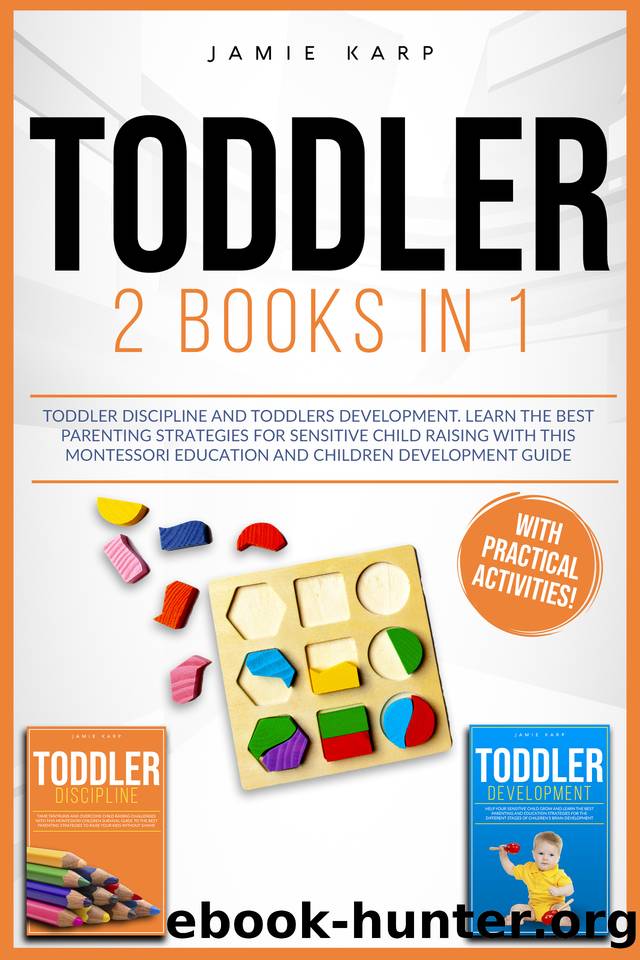TODDLER: 2 BOOKS IN 1: Toddler Discipline and Toddlers Development. Learn the Best Parenting Strategies for Sensitive Child Raising with this Montessori Education and Children Development Guide by Jamie Karp

Author:Jamie Karp [Karp, Jamie]
Language: eng
Format: azw3, epub
Published: 2020-10-23T00:00:00+00:00
CHAPTER 1:
12-17 months
Introduction
T his is extremely exciting as your baby will be trying to take their first steps without support, become more communicative and learn new words, eat and drink things other than just milk, and enjoy playtime. This is the age where a child's communication skills mature. The babbling is no longer just a bunch of made-up words but rather, includes more real names than before. They also learn to say things like ball, toy, cat, dog, or car, etc. Their pointing and poking skills also improve, and they will add a nod or grunt when asking for things to confirm whether they want it or not.
As they are becoming more and more aware of their surroundings and starting to enjoy colors, shapes, and images, they will be eager to hear stories or bring books to you for you to read to them. They will stay calm throughout the reading time, which shows that they are taking in all the information being transferred, which is a great sign. When asked where they have placed their blanket or toy, they will point to it, which means they understand "what is what." They not only learn new words but also learn to use them correctly. For example, if you ask them where their nose is, they will point at it.
Physical development also includes some fantastic milestones. For many kids, this is the time when they finally take their first steps, thanks to the flexibility and strength of their muscles. Other than that, they also use their hands and feet to pick things up and become faster at crawling and walking with support.
Again, this may be early to expect, but some kids do walk in the first months after turning one. They have already mastered the crawl, and walking seems like their next most favorite activity. But we aren't talking full-on walking or running; we mean taking a few steps without any support and then reaching for help. Parents can encourage walking by placing something desirable for them to go and get. They are ready to let go of the cuppy with a lid and ready to enjoy drinking right from a glass, like an adult. Since their hands are more reliable than before and their grip has improved, they no longer require handles and simply grip onto the sides of the cups firmly.
Other than walking, their bones also allow them to jump or climb stairs and furniture. They can push their bodies forward or upward with the help of some support. Since they are going to be wanting to be left free, parents will have to start baby-proofing areas like stairs to ensure maximum safety.
Gestures and Language
The end of the beginning is here, with what I call the "beginning" being the first twelve months. Now when you look back to the time you gave birth to that innocent, helpless, little baby, and compare it to the present day, you find that a lot of changes have taken place in your little one, well, meanwhile, the significant changes have barely started.
Download
TODDLER: 2 BOOKS IN 1: Toddler Discipline and Toddlers Development. Learn the Best Parenting Strategies for Sensitive Child Raising with this Montessori Education and Children Development Guide by Jamie Karp.epub
This site does not store any files on its server. We only index and link to content provided by other sites. Please contact the content providers to delete copyright contents if any and email us, we'll remove relevant links or contents immediately.
| Administration & Medicine Economics | Allied Health Professions |
| Basic Sciences | Dentistry |
| History | Medical Informatics |
| Medicine | Nursing |
| Pharmacology | Psychology |
| Research | Veterinary Medicine |
Bioenergetica by Alexander Lowen(1475)
The Child in You by Stefanie Stahl(1270)
No Bad Parts by Richard C. Schwartz(1254)
Noise: A Flaw in Human Judgment by Sunstein Cass R. & Sibony Olivier & Kahneman Daniel(1192)
The Data Detective by Tim Harford(1136)
Chatter by Ethan Kross(1071)
The Science of Rapid Skill Acquisition by Peter Hollins(923)
The Quantum Psychiatrist: From Zero to Zen Using Evidence-Based Solutions Beyond Medication and Therapy by Biswas Dona(881)
Freedom by Sebastian Junger(861)
The Montessori Baby by Simone Davies(859)
Maps of Meaning: The Architecture of Belief by Jordan B. Peterson(752)
The Science of Self-Learning: How to Teach Yourself Anything, Learn More in Less Time, and Direct Your Own Education (Learning how to Learn Book 1) by Peter Hollins(749)
Evolution Gone Wrong: The Curious Reasons Why Our Bodies Work by Alex Bezzerides(708)
Sadomasochism and the BDSM Community in the United States by Stephen K. Stein(696)
Anxiety For Dummies by Charles H. Elliott & Laura L. Smith(671)
Disconnected by thomas Kersting(665)
Why Sex Doesn't Matter by Olivia Fane(664)
The Mechanics of Passions: Brain, Behaviour, and Society by Alain Ehrenberg(634)
Jung - The Key Ideas: Teach Yourself (TY Philosophy) by Ruth Snowden(629)
